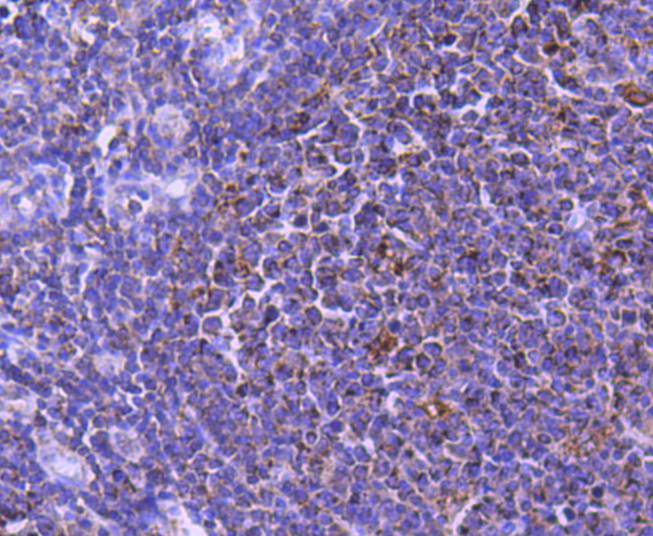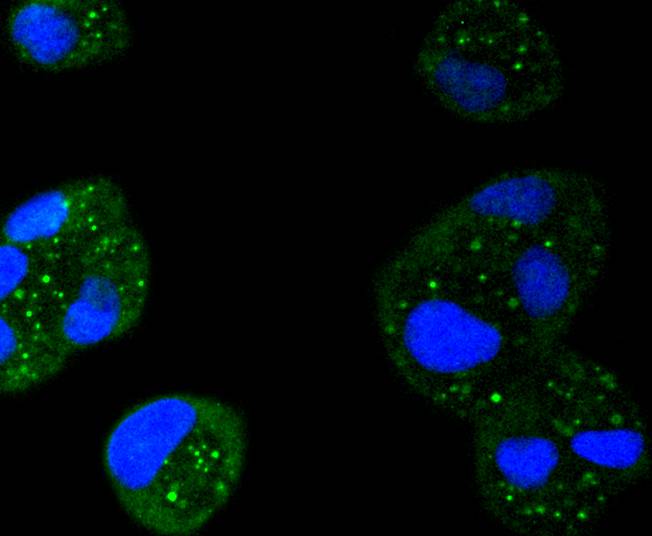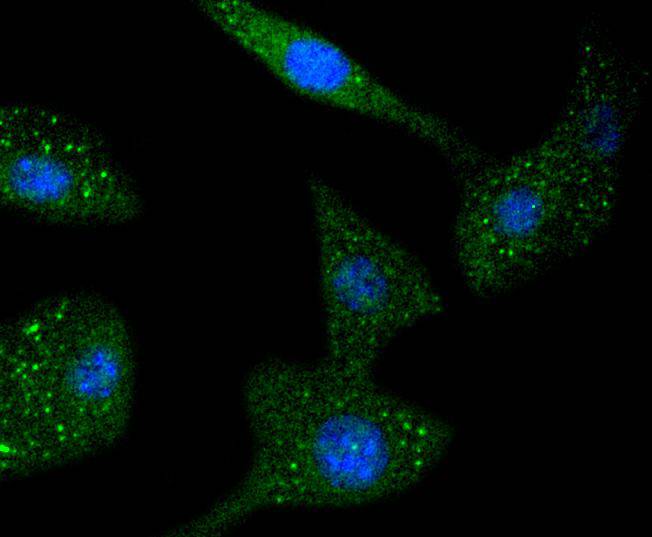Product Detail
Product NameSTAT6 Rabbit mAb
Clone No.SY02-72
Host SpeciesRecombinant Rabbit
Clonality Monoclonal
PurificationProA affinity purified
ApplicationsWB, ICC/IF, IHC, IP
Species ReactivityHu, Ms
Immunogen Descrecombinant protein
ConjugateUnconjugated
Other Names12S1644 antibody D12S1644 antibody IL 4 STAT antibody IL-4 Stat antibody IL4 STAT antibody Interleukin 4 Induced antibody Interleukin 4 Induced Transcription Factor IL4 STAT antibody Signal transducer and activator of transcription 6 antibody Signal Transducer And Activator Of Transcription 6 Interleukin 4 Induced antibody Signal Transducer And Activator Of Transcription 6 Nirs Variant 1 antibody Signal transducer and activator of transcription 6, interleukin 4 induced antibody STAT 6 antibody STAT interleukin4 induced antibody STAT, interleukin4 induced antibody Stat6 antibody STAT6_HUMAN antibody STAT6B antibody STAT6C antibody Transcription factor IL 4 STAT antibody
Accession NoSwiss-Prot#:P42226
Uniprot
P42226
Gene ID
6778;
Calculated MW94 kDa
Formulation1*TBS (pH7.4), 1%BSA, 40%Glycerol. Preservative: 0.05% Sodium Azide.
StorageStore at -20˚C
Application Details
WB: 1:1,000-1:2,000
IHC: 1:50-1:200
ICC: 1:50-1:200
Western blot analysis of STAT6 on different lysates using anti-STAT6 antibody at 1/1,000 dilution. Positive control: Lane 1: Hela Lane 2: Raji
Immunohistochemical analysis of paraffin-embedded human breast carcinoma tissue using anti-STAT6 antibody. Counter stained with hematoxylin.
Immunohistochemical analysis of paraffin-embedded human kidney tissue using anti-STAT6 antibody. Counter stained with hematoxylin.
Immunohistochemical analysis of paraffin-embedded mouse lung tissue using anti-STAT6 antibody. Counter stained with hematoxylin.
Immunohistochemical analysis of paraffin-embedded human tonsil tissue using anti-STAT6 antibody. Counter stained with hematoxylin.
Immunohistochemical analysis of paraffin-embedded mouse stomach tissue using anti-STAT6 antibody. Counter stained with hematoxylin.
ICC staining STAT6 in Hela cells (green). The nuclear counter stain is DAPI (blue). Cells were fixed in paraformaldehyde, permeabilised with 0.25% Triton X100/PBS.
ICC staining STAT6 in AGS cells (green). The nuclear counter stain is DAPI (blue). Cells were fixed in paraformaldehyde, permeabilised with 0.25% Triton X100/PBS.
ICC staining STAT6 in NIH/3T3 cells (green). The nuclear counter stain is DAPI (blue). Cells were fixed in paraformaldehyde, permeabilised with 0.25% Triton X100/PBS.
Membrane receptor signaling by various ligands, including interferons and growth hormones such as EGF, induces activation of JAK kinases which then leads to tyrosine phosphorylation of proteins that have been designated Stats (signal transducers and activators of transcription). The first members of this family to be described include Stat1α p91, Stat1β p84 (a form of p91 that lacks 38 COOH-terminal amino acids) and Stat2 p113. Stat1 and Stat2 are induced by IFN-a and form a heterodimer which is part of the ISGF3 transcription factor complex. Stat3, which becomes activated in response to epidermal growth factor (EGF) and interleukin-6 (IL-6), but not interferon-? (IFN-?) or Stat4, is an additional member of this family. It has been suggested that the phosphorylated forms of both Stat3 and Stat4 form homodimers as well as heterodimers with the other members of the Stat family, and that differential activation of different Stat proteins in response to different ligands should help to explain specificity in nuclear signaling from the cell surface. Highest expression of Stat4 is seen in testis and myeloid cells. IL-12 has been identified as an activator of Stat4. Other members of the Stat family include Stat5, which has been shown to be activated by prolactin and by IL-3, and Stat6 (also designated IL-4 Stat), which is involved in IL-4-activated signaling pathways.
If you have published an article using product 48795, please notify us so that we can cite your literature.











 Yes
Yes



